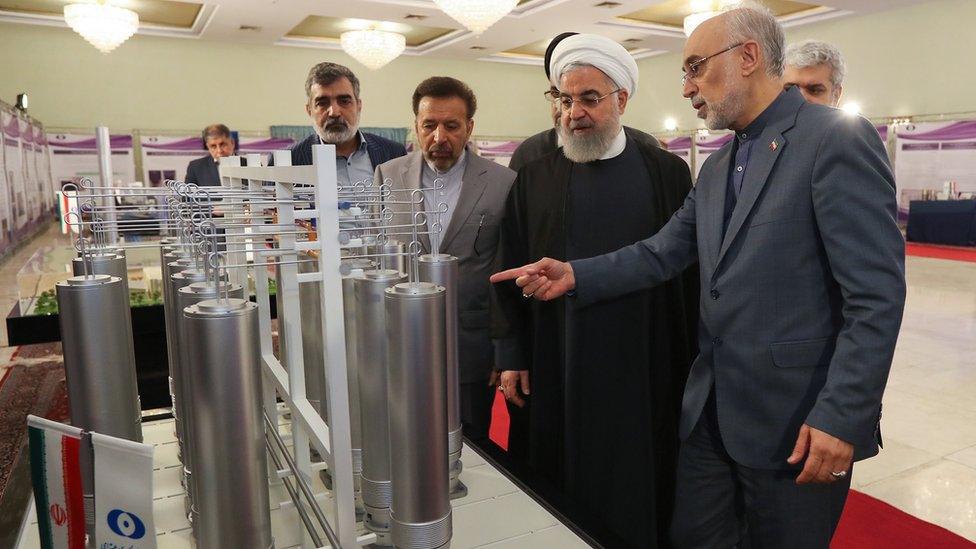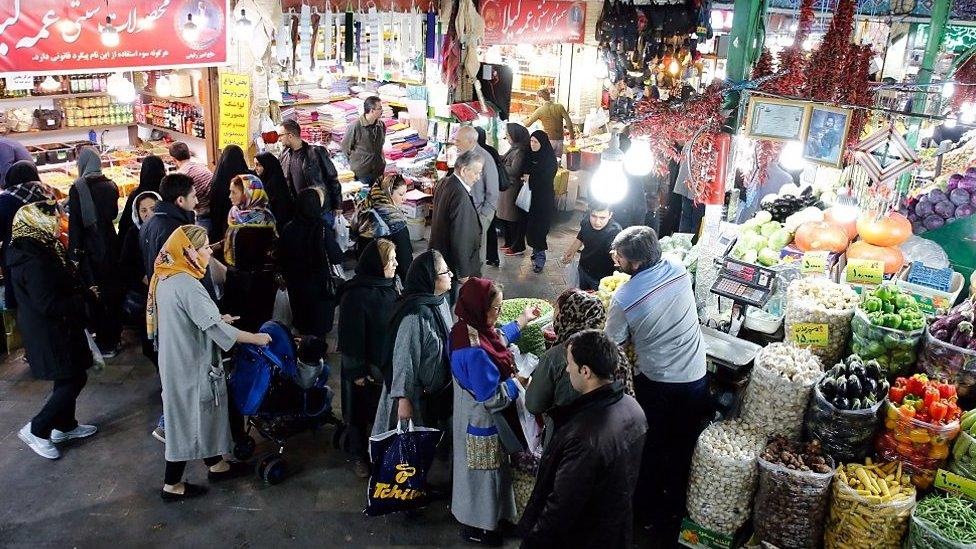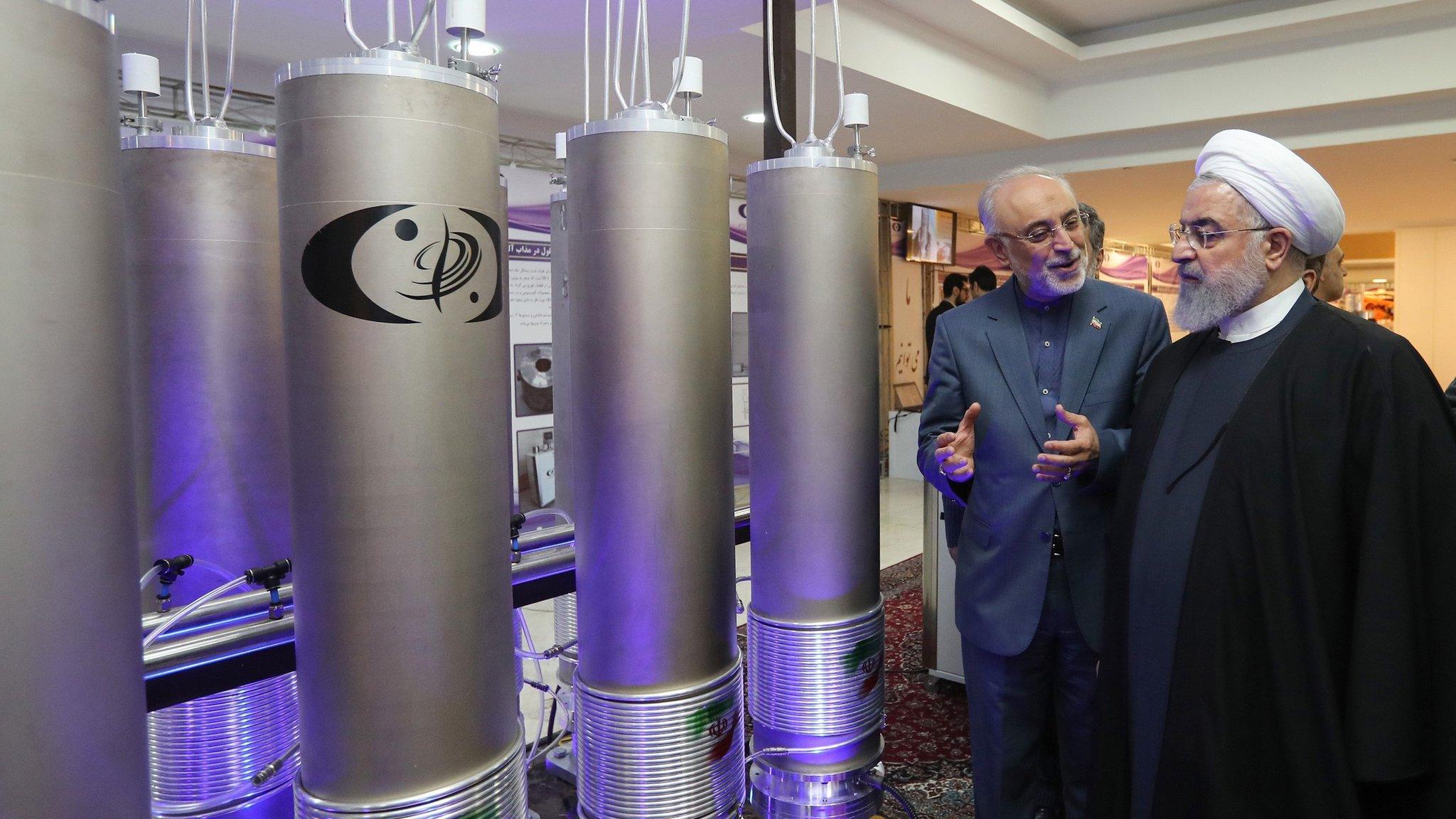Iran nuclear deal: UN ambassador says Europe 'must compensate' Iran
- Published
Iran's representative to the UN: Europeans 'are not honouring their commitments' on nuclear deal
Iran's ambassador to the UN is insisting that the Europeans do more to compensate Tehran for economic losses inflicted by US sanctions - otherwise Iranians will continue to exceed limits on their nuclear fuel production.
However, Majid Takht-Ravanchi told the BBC that Iran would stay in the nuclear accord for now.
He also said there would be consequences if the UK didn't release an Iranian oil tanker it seized recently off the coast of Gibraltar.
Tensions have risen sharply since the US pulled out of the deal which restricted Iran's nuclear programme in exchange for sanctions relief.
Tehran took no immediate action after the US re-imposed punishing sanctions last year, but has now begun to nudge the levels of its enriched uranium beyond the deal's limits, in small and calculated steps.
Mr Ravanchi said that Iran was not violating the accord, which he was involved in negotiating. He cited what he said were provisions that allowed a rollback on some commitments if other parties were in breach.
"For the time being we are in the deal and we invite others to stay in the deal," he said. But Iran would move to the "third phase" of its stepped-up uranium enrichment programme unless the Europeans kept promises to uphold the economic benefits of the accord.

Iran's President Hassan Rouhani says world powers have failed to abide by their commitments
"Apparently, besides the US the Europeans have not been up to the job and have not honoured all their commitments up to now," he said.
The Europeans have tried to do so with a transaction channel that would allow continued trade with Iran despite US sanctions. But it's only recently been activated, and companies are reluctant to take the risk of US retaliation.
Mr Ravanchi said reports that Iran may dramatically raise levels of uranium enrichment to 20% purity in "phase 3" were hypothetical, suggesting a certain amount of brinkmanship.
Such a move would almost certainly hasten the collapse of the deal and raise the prospect of US or Israeli military strikes against nuclear facilities.
"We have said we are not going to honour the cap of 3.67%," the ambassador said. "What will happen in the third phase we have not said it yet, but if we reach to that point, definitely we will announce beforehand."
Shortly before the interview, a commander in Iran's elite Revolutionary Guards warned that US military bases and aircraft carriers were within range of the country's missiles, and would be destroyed if America made any "mistakes".
Iran's FM Mohammad Javad Zarif says its next step will be enriching uranium beyond 3.67%
The ambassador said this was not a threat, but a signal that the Iranians would not "sit on their hands" if attacked.
He also denied that the Iranian oil tanker seized by the British was headed to Syria in breach of EU sanctions as alleged, calling the move a "clear case of piracy and violation of international law".
"It is better for the British government to release this ship as soon as possible otherwise there will be consequences," he said, but he did not confirm reports that Iran was prepared to seize UK-flagged ships in retaliation.
Mr Ravanchi said he did not think US President Donald Trump wanted a war with Iran but believed his National Security Adviser John Bolton did. Mr Bolton openly called for regime change in Tehran before taking office in the White House.
The ambassador said negotiations with the US could not take place unless the Trump administration lifted sanctions "at the least".
And he also dismissed as an "absurd assumption" any suggestion that Iran's severely depleted oil exports would lead to an economic collapse.
"We have managed under different situations worse than we have today, and I am sure we can manage again," he said, invoking the Iran-Iraq war which lasted eight years.
- Published23 November 2018

- Published30 April 2021
